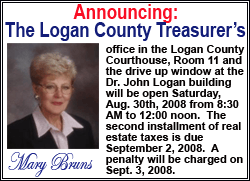|
 The
finance committee shortened the process last year by just having
budget request paperwork submitted. During the morning’s hearing
County Clerk and Recorder, Sally Litterly said at the conclusion of
her report that she appreciated the face-to-face opportunity that
the hearings provided. It gave her a chance to explain some of what
goes on in her office. The
finance committee shortened the process last year by just having
budget request paperwork submitted. During the morning’s hearing
County Clerk and Recorder, Sally Litterly said at the conclusion of
her report that she appreciated the face-to-face opportunity that
the hearings provided. It gave her a chance to explain some of what
goes on in her office.
Litterly said her office is a 3-fold
department, 1) clerk 2) recorder and 3) election authority. She also
said that the clerk and recorder positions are separated in counties
that have a population over 60,000. In addition, some counties also
have separate election authorities.
Her office performs a myriad of duties
and diverse functions, which she touched on those with changes for
the committee. In the
recording division, Litterly’s Office will be bringing everything
from the 1960’s through the early 1980’s that is currently on
microfilm up to date on the computer. It will cost $8,000 in funds
that are already coming in to pay for this project.

Recorder fees contribute to several
funds that include the clerk’s office, the county general fund,
document storage, Illinois Rental Housing Authority and the
Geographic Information System. Document fees would have a slight
raise this year from $4.00 to $6.00, beginning December 1, 2008. Not
all filings include the housing fee. GIS gets $15 of each filing.
The county highway engineer, Bret
Aukamp, has assisted to see that the mapping is completed and is now
taking it to different agencies and departments for online uses. It
will need an administrator. Litterly pointed out that municipalities
and other resources would be needed to fund its next stages of
development. Many of the
clerk’s duties are regulated or limited by state and federal
mandates. Some of the work has grant funding available which
Litterly says she applies for whenever possible. The county has
received federal funds in the past and hopes to in the future from a
grant offered by Help America Vote Act. Litterly said that she has
reapplied for more funds from this program and anything else she can
find to help offset election costs.
The county has 225 election judges. The
state provides speakers for election judge training, as well as
Litterly and her staff and will be doing so on Thursday, September
18 at 1:00 p.m. and Wednesday, October 8th at 6:30 p.m.
[to top of second column]
 |

A cost that is beyond their control with elections is the amount of
information on the ballot. The last election had many names and
parties. The next general election will have fewer names and
combination possibilities, which means that it will cost less,
Litterly said.
April is going to have literally 150 different ballot styles you
could vote, Litterly said, and it would include referendums. This
will be a consolidated election that covers townships, parks,
libraries, school, villages and cities.
However, she is watching as another election could be forced that
would carry an additional cost to the county this spring. By law if
there would be four times the number of position(s), plus the number
file for any office in the consolidated, then that would force a
primary election to be held in February.
As an example, there are usually two alderman positions per ward
for the city of Lincoln on that ballot. 4 X 2 + 2 = 10. If there
would be 10 candidates seek alderman for any one ward that would
force a primary to be held in February.
While the alderman scenario is not likely, the office of mayor
for the City of Lincoln could present that problem. Four times one
position, plus one, equals five. Five candidates would have to file
for the office of mayor is order to force a Primary Election.

To date three candidates have either filed or openly expressed
interest, and two more are being rumored as interested.
If four or less candidates file, it would just be combined with
the April election that is already slated, and would save the
taxpayers thousands of dollars, Litterly explained.
$67,000 has been spent in the Primary Election also this year,
Litterly said.
Ruben thanked Litterly for coming in and said that the meetings
are helpful to the committee members that are not familiar with the
offices. There would likely be hearings held next year with a lot of
new faces coming on the board.
[By JAN YOUNGQUIST]
|